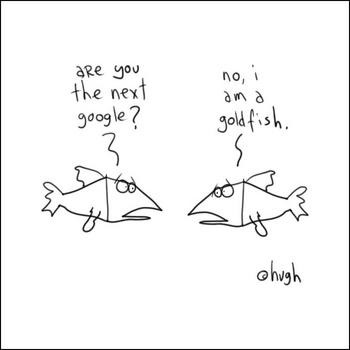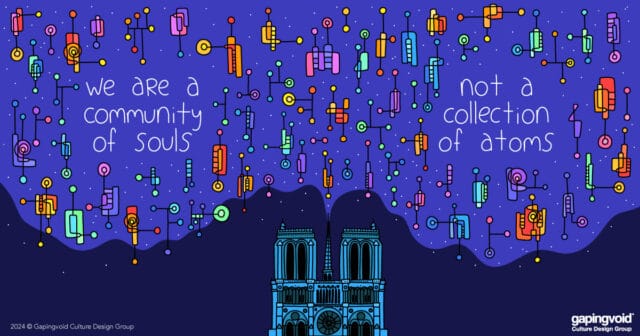
[Cartoon inspired by Guy Kawasaki’s recent post.]
Madison Avenue and Web 2.0
If you’re currently working in a large Madison Avenue ad agency, chances are you have already been asked by a lot of your big clients, about what the heck you’re going to do about this whole Web 2.0 thing.
And of course, you haven’t got a clue. You got into the business for the award-winning TV commercials, let’s not kid ourselves.
Still, maybe you can buy your career another twelve months of life by trying to fob off a third-rate, client-branded MySpace or YouTube clone, or whatever.
“Yeah! Millions of people are going to come our social software site and interact, chat, send messages, post their photos, movies, music files and oh yeah, buy our bathroom cleaner as well…”
Yep. We already know where this is going. We saw the same thing happen in Web 1.0:
[A] Madison Avenue tries to copy Silicon Valley and
[B] does a really bad job of it and
[C] does it four years too late.
[D] Ouch. Ouch. Pain.
That being said, your clients still have a legitimate concern, which isn’t going to go away. Namely, how do they realistically mesh with Web 2.0? That’s where the smart money is going, after all.
Having pondered this question, I think I may have come up with an answer.
Usually I’m happy to share these kinds of ideas with everybody via this blog. Not this time. It’s too good.
But if you want me to tell you what I came up with, feel free to write me out a check for $100,000 and put me on a year’s retainer at say, $15,000 per month. Then maybe we’ll talk.
Groovy.
Reader Comment: Rachel Clarke
I’m already being asked. A lot. But so far managing to move them away from ‘we want to be YouTube’ to having far more realistic expectations. And what we do works, sometimes. It almost always comes down to control though. And lawyers. And fear. Breaking that down is the hard job.
[UPDATE:] Rachel also sent me this:
CAMBRIDGE, Mass. – December 13, 2006 – Just over half (52%) of Chief Marketing Officers (CMOs) believe that traditional, large advertising agencies are ill-suited to meet online marketing needs, according to a study of senior marketing executives conducted by Evalueserve and released today by Sapient (NASDAQ: SAPE). Similarly, 49% of survey respondents believe that traditional advertising firms have difficulty thinking beyond traditional print and TV media models, which no longer are effective ways of engaging consumers who now get their information and influence one another primarily through digital channels.



